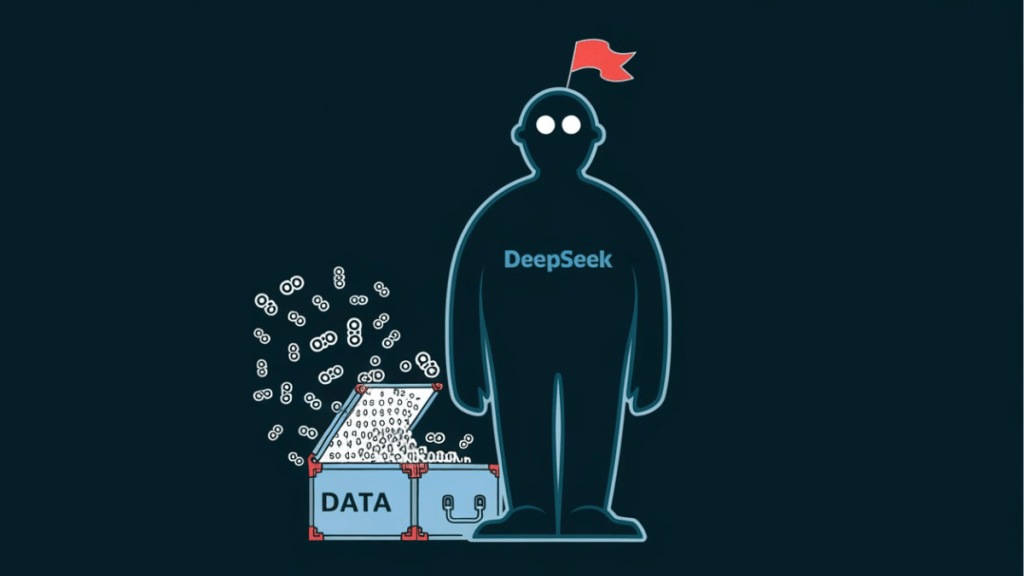The relationship between the world and DeepSeek is beginning to feel like a complicated situationship—one part gaslighting, another part breadcrumbing, with a sprinkle of orbiting thrown in for good measure. If those terms seem unfamiliar, they perfectly capture the confusion and uncertainty I experienced while trying to navigate DeepSeek’s privacy policies. As DeepSeek continues to dominate the app store charts, its rapid ascent has raised more than just eyebrows—it’s sparked growing concerns about user data privacy. While millions of users flock to this ChatGPT competitor, questions are mounting, particularly due to DeepSeek’s servers being based in China. In a climate of intense global scrutiny over Chinese tech companies, many are asking: is DeepSeek yet another app that regulators should be closely monitoring?
Data stored in China: DeepSeek is stalking your data like an obsessive ex
DeepSeek’s privacy policy makes it clear: user data, including chats, prompts, and personal information, is stored on servers in China. And in China, data laws aren’t just about security—they’re about government control. Under the country’s Cybersecurity Law and Data Security Law, tech companies must hand over user data upon request, often without transparency or independent oversight.
This is what makes DeepSeek particularly alarming. “China’s data security laws grant the government broad access to data stored within its jurisdiction,” Dhruv Garg, Partner, India Governance and Policy Project (IGAP), told BrandWagon Online. “This raises concerns about the potential misuse of sensitive user data, especially for foreign users.”
From location tracking to keystroke analysis, DeepSeek collects a staggering amount of user information. While biometric data tracking is becoming more common—TikTok does it too—DeepSeek’s vague policies leave a lot of questions unanswered. What exactly is being done with this data? Who has access to it? And in the event of a cyberattack, how vulnerable is it?
A history of suspicion: Has a shady history, but swears it’s changed
This isn’t the first time Chinese apps have come under fire for their data practices. India, for instance, has already banned over 200 Chinese apps—including TikTok, WeChat, and UC Browser—citing national security concerns. Given DeepSeek’s rising popularity, could it be next on the chopping block?
“It’s possible that Indian authorities may assess its data practices, especially if the app blows up in India,” Garg added. “Additionally, DeepSeek will have to comply with the Digital Personal Data Protection Act (DPDPA) 2023 and relevant rules once they’re implemented.”
The DPDPA (Digital Personal Data Protection Act) imposes strict requirements on companies handling Indian user data, including mandates for local data storage and greater transparency around cross-border transfers. If DeepSeek continues to store user data in China without safeguards, it could face serious regulatory roadblocks in India—and possibly elsewhere.
The AI ethics dilemma: Bias, censorship, and manipulation
Beyond privacy concerns, DeepSeek’s AI itself raises questions. Like many AI models trained in China, it appears to be subject to censorship. For example, users reportedly cannot ask DeepSeek about politically sensitive topics such as the 1989 Tiananmen Square massacre. This selective filtering of information could shape users’ perceptions in subtle but significant ways.
“With or without AI, China has always influenced and controlled global media narratives in its favor,” Gowthaman Ragothaman, founding CEO, Aqilliz, said. “DeepSeek will be no different if they are running global operations from servers in China.”
This is particularly concerning as AI chatbots become a go-to source for information. If a language model is trained on biased or censored data, it risks perpetuating misinformation on a massive scale. “Centralised AI is a runaway train wreck,” Rangothaman added. “Decentralisation is key for safe and secure application of AI.”
DeepSeek’s business model: Lack of transparency = Red flags
Another major issue with DeepSeek is its murky data-sharing policies. While the app’s privacy policy states that user data may be shared with “business partners” and “corporate groups,” it doesn’t specify who these entities are.
“It most definitely indicates a lack of transparency,” Rangothaman commented. “Users should be very concerned about sharing their data with DeepSeek in its current form.”
This is a critical issue because data is the new currency. If a company isn’t clear about who it’s sharing data with, it could be monetising user information in ways that users never consented to. And in jurisdictions with strict data localisation laws, such as India or the EU, this could spell legal trouble.
DeepSeek is giving salty ex vibes, and the world is catching on
DeepSeek’s rapid rise has set off alarm bells worldwide, with governments taking a hard pass on its charm. The U.S. Navy wasted no time cutting ties, banning personnel from using the AI over security and ethical concerns. President Trump, calling China’s AI dominance a “wake-up call,” responded with a massive $500 billion investment in domestic AI under the “Stargate” initiative. In the UK, Technology Secretary Peter Kyle side-eyed DeepSeek’s built-in censorship, warning users to tread carefully. Meanwhile, Australia’s Treasurer Jim Chalmers urged citizens to stay wary as the government closely monitors the platform.
Not everyone, however, is willing to let DeepSeek steal the spotlight. India has officially entered the AI race, with Union IT Minister Ashwini Vaishnaw announcing plans to develop the country’s own generative AI model.
So, should you be worried?
There’s no denying that AI chatbots like DeepSeek are fascinating, offering users a new way to interact with technology. But as AI becomes more integrated into our daily lives, the stakes for privacy and security are higher than ever.
DeepSeek’s connection to China’s data laws, its lack of transparency, and its potential for biased content moderation make it a risky bet for users outside China. As Garg puts it, “Given these legal frameworks, foreign users’ data could be subject to Chinese government scrutiny, posing risks such as unauthorised access, surveillance, and data exploitation.”
The takeaway? Be cautious. Read the fine print before agreeing to a privacy policy you barely skimmed. And maybe—just maybe—think twice before trusting an AI with your personal information, especially when it’s backed by a government that doesn’t believe in privacy the way you do.

